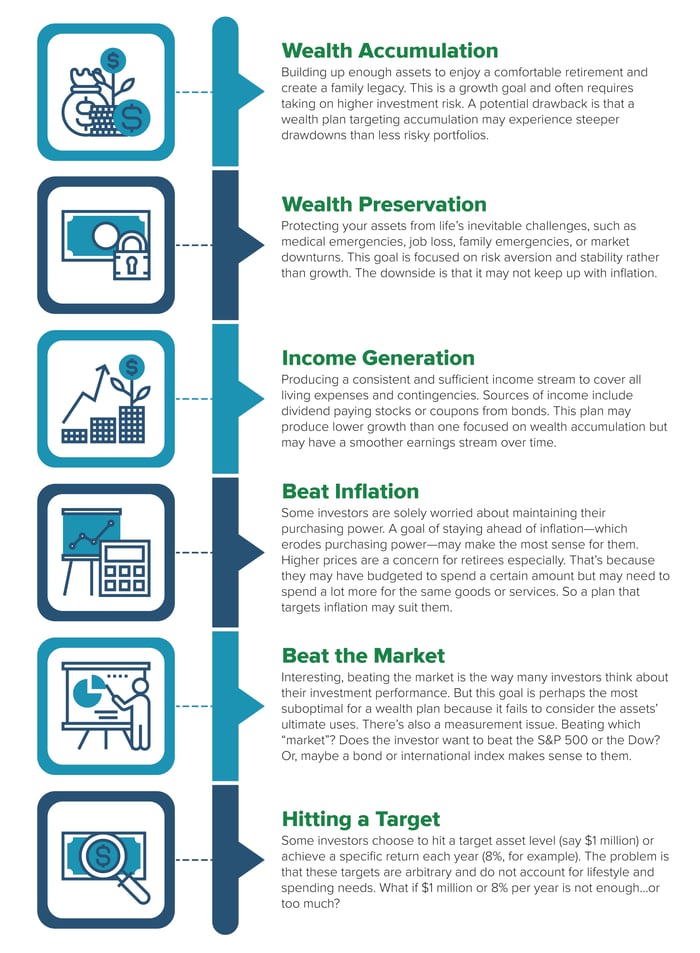Wealth means something different to everyone. What does it mean to you?
For some people, wealth might mean a seven-figure investment portfolio that continues to grow year by year, creating a legacy for future generations. For others, the definition of wealth might be more modest, such as simply having enough to live life fully, without worrying about outliving their assets.
Although money is a way to measure wealth, wealth encompasses far more than money. Perhaps in its broadest sense, wealth can simply mean abundance in all its forms.
It could be the ability and the freedom to live your life to the fullest, with a sufficient income stream to cover your expenses—without having to work—or worry that you will outlive your money. Or the capacity to achieve all of your financial, personal, and retirement goals.
But no matter how you define wealth, you should consider adopting goal-based investing—setting specific investment objectives—and then create a plan to help you achieve those goals. As you begin to meet your investment goals, you should be in a far better position to also fulfill your personal ambitions and secure a long and happy retirement.
So what are your goals?
It’s easier to work toward specific, quantifiable retirement goals rather than vague goals. Some of the following goals may apply to you and your family. They’re not mutually exclusive. Of course, you may have some other goals to add to the list.
 Your financial goals may change over time as your priorities shift. For example, early in your career, you may be more inclined to accumulate wealth, but in your retirement years, you may be focused on income generation. Or you may have a wealth accumulation goal for the money earmarked for your heirs but want to beat inflation for your retirement funds. Regardless of whether you have one or several goals, each one requires a roadmap to help achieve success.
Your financial goals may change over time as your priorities shift. For example, early in your career, you may be more inclined to accumulate wealth, but in your retirement years, you may be focused on income generation. Or you may have a wealth accumulation goal for the money earmarked for your heirs but want to beat inflation for your retirement funds. Regardless of whether you have one or several goals, each one requires a roadmap to help achieve success.
It starts with a comprehensive wealth plan
Your wealth plan is a personalized blueprint or map to help you achieve your financial goals. Planning plays a critical role in helping you create financial independence based on what you want to do and have. Your plan serves as your long-term investment strategy that you can adjust tactically over time as your priorities change. A properly designed wealth plan should include creating a diversified investment portfolio that strives to meets your financial objectives, tolerance for risk (volatility), and time horizon.
But a wealth plan on paper is NOT a guarantee of successful results. Consistent execution can contribute greatly to one’s success.
And ends with the appropriate measure of success
Some investors ask just one question: How much did my portfolio return last year?
Let’s say your portfolio returned 5%. Was that good or bad? Compared to what? Was it 1% less than you earned the previous year? Was it higher than the rate of inflation for the year? Maybe it was 2% less than you expected to earn. Was the return better or less than your neighbors’? Did just one asset account for most of that return, while your other assets stood still?
The fact is, gauging success should not be one-dimensional for most investors. Nor is there a “one size fits all” assessment. Because the goals of your wealth plan probably differ from your sister’s, your neighbors’, and your friends’. In other words, don’t try to compare apples and oranges.
Sure, measuring your performance against a broad market index—like the S&P 500—is reasonable if your goal is to beat the market. Or benchmarking the growth of your portfolio to inflation if that’s your goal.
But if you want to accumulate or preserve wealth, or generate income, then simple comparisons to an index or inflation don’t really tell the whole picture of how you are doing. Instead, your wealth strategy will include milestones that you need to meet to stay on plan. They are unique to your situation and don’t care at all about what the market is returning, or how your neighbor or sister is doing!
It’s hard not to get caught up in comparing yourself to others or the market. But understanding that your plan is designed for your specific goals can go a long way in keeping you sane when the market fluctuates or your friends brag. As long as you stay with your plan, you should feel comforted that you are working towards your meaning of wealth.
Related tags
Financial Planning
Like what you're reading?
Join the thousands of readers getting stories like this delivered straight to their inbox every Thursday — for free. Give it a spin, enter your email to sign up.
Related Articles

Wealth Planning: Early Career
Congratulations, you’ve just graduated college or landed your first job. You may feel as though the...

Wealth Planning Guide Report 2026
Managing your wealth involves juggling many moving parts, and it can feel overwhelming. Rather than...

In Active vs. Passive, the Economy May Deliver the Knockout Punch
The S&P 500 fell over 19% in 2022. Unfortunately, those investors tied to the S&P 500's performance...
